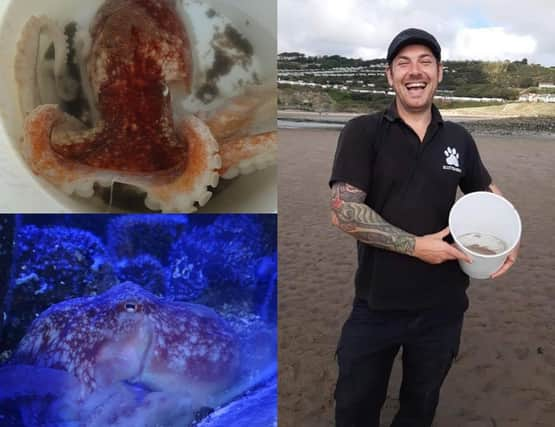Scottish SPCA saves two octopuses in one day and houses them at Deep Sea World


Animal welfare charity the Scottish SPCA were recently called to rescue but two curled octopuses on the same day.
The charity was called to the two cephalopods, within just hours of each other after they were found by members of the public washed up on the beach in Kingshorn, Burntisland.
Advertisement
Hide AdAdvertisement
Hide AdAnimal rescue officer, Robert Ward, said, “I’ve never been called to an incident involving an octopus before, never mind two in the one day.
“Octopuses can survive on land for 20 to 30 minutes and often crawl between rock pools looking for food.
“Although not seen very often, they are found in UK waters. If members of the public spot an octopus on land, normally we’d encourage them to leave the aquatic creature alone as it will naturally make its way to the nearest tide pool.
“However, on these two occasions the octopuses were nowhere near water and coming close to the 30 minute mark.
“I called Deep Sea World, who advised that as its breeding season the octopuses may beach themselves again if released and could die from exposure.
“We decided the best thing for them would be to take them there where they could be safely housed, as we don’t have the facilities to care for sea creatures at our National Wildlife Centre.
“It was amazing to see these fascinating animals up close and be able to help them. After all, we’re suckers for a happy ending here at the Scottish SPCA!”
Michael Morris, Deep Sea World displays supervisor and dive officer, said, “The octopus were both discovered during a time where the gravitational force of both the moon and sun are aligned causing extremely low tides.
Advertisement
Hide AdAdvertisement
Hide Ad“This happens only around five or six times per year, possibly linked with the discovery of these animals at a very low tide. They may also have been protecting recently laid eggs, as the peak of their breeding season is towards the end of September.
“The octopus have settled in well and visitors to the aquarium have been enjoying learning about and observing these unusual creatures.”
If anyone finds an animal in distress they should call the Scottish SPCA animal helpline on 03000 999 999 from 7am until 9pm seven days a week.